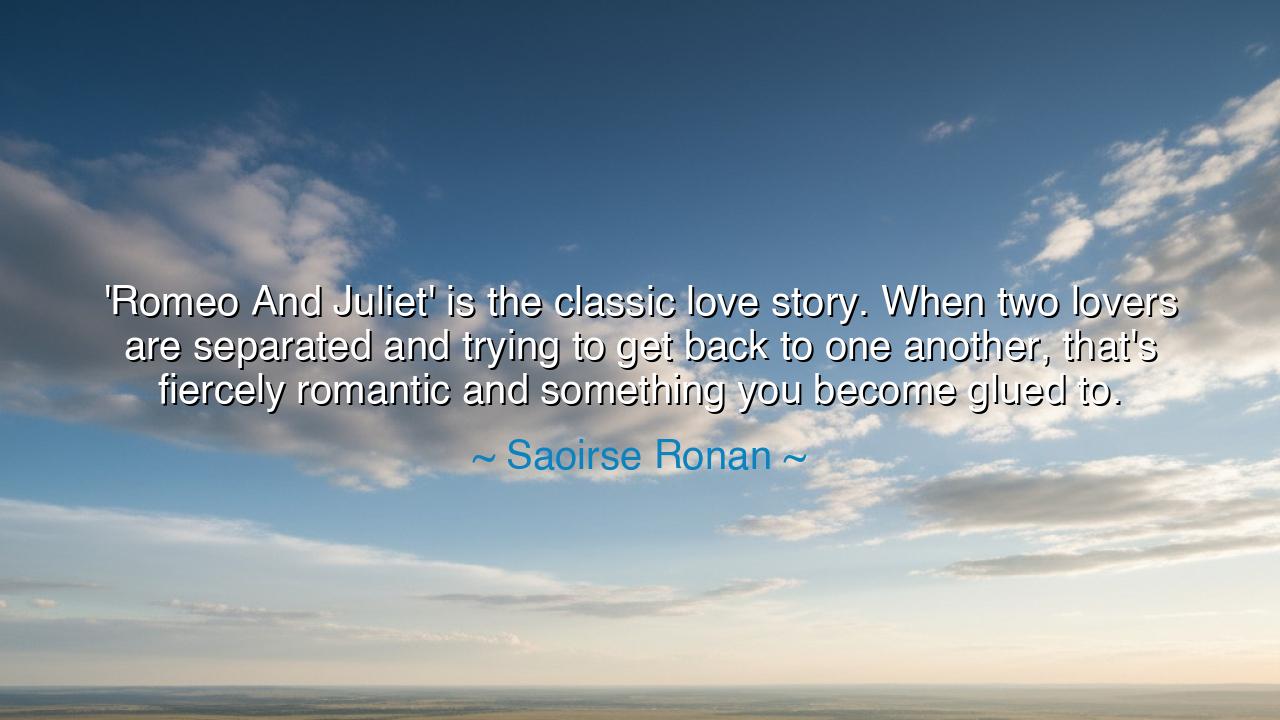
'Romeo And Juliet' is the classic love story. When two lovers are
'Romeo And Juliet' is the classic love story. When two lovers are separated and trying to get back to one another, that's fiercely romantic and something you become glued to.






Come, my children, and listen to the wisdom in the words of Saoirse Ronan, who spoke with passion about one of the greatest love stories ever told: "'Romeo and Juliet' is the classic love story. When two lovers are separated and trying to get back to one another, that's fiercely romantic and something you become glued to." In these words, Ronan touches upon the timeless nature of love—the kind of love that burns bright, that defies the odds, and that calls to us with a force that is both tragic and beautiful. The love between Romeo and Juliet has captured the hearts of generations, and its story is a testament to the power of romantic longing, the desire to be reunited with the one you love, no matter the cost.
In the ancient world, the story of Romeo and Juliet would not be unfamiliar to the bards and poets of old. Love that is interrupted by fate or the forces of the world has long been a theme of great stories. The Greeks, for example, told tales of Orpheus and Eurydice, a love so strong that Orpheus descended into the underworld to retrieve his wife, only to lose her forever when he failed to trust the gods' command not to look back. Their love, like that of Romeo and Juliet, was fierce and unyielding, but also doomed. These tales remind us that the longing for someone who is beyond our reach is both a source of strength and suffering, and yet it is this yearning that makes the love story so powerful.
Consider, too, the tragic love of Heloise and Abelard, two figures whose love story transcended time and space. Their love was not just romantic but intellectual—two minds deeply in love, but torn apart by circumstances beyond their control. Abelard was a scholar and teacher, and Heloise his student. Their passion for one another defied the conventional expectations of their time. But the world was not kind to their love, and they were separated by betrayal and circumstance, much like Romeo and Juliet. Yet, even in their separation, their love did not fade; it endured, sustained by letters and the memory of what they had once shared. Ronan is right in saying that this type of longing, this romantic pursuit, is magnetic—it pulls us in, makes us invest our hearts in their struggle, knowing that the path they walk is fraught with heartbreak and hope.
What is it, my children, that makes such stories of separation so universally compelling? It is the fierce nature of love that refuses to be extinguished. Romeo and Juliet are not just two lovers—they are the embodiment of the human spirit’s desire to unite, to find completeness, to transcend the divisions that the world places between us. In their story, we see a reflection of ourselves, of our own yearning for connection and our willingness to sacrifice everything in the name of love. The power of the story lies not just in its tragedy but in its universal theme: love is a force that cannot be contained by walls or fate; it seeks to overcome, to endure, and to reunite.
Consider, my children, the ancient myth of Pyramus and Thisbe, whose love was so intense that, like Romeo and Juliet, it led to a tragic end. Separated by walls and the expectations of their families, they communicated in secret, dreaming of a time when they could be together. When fate conspired against them, and they could not meet as they had planned, they both chose death, their love so strong that they could not bear to live without each other. Their story, too, reflects the eternal struggle of lovers who are kept apart by forces beyond their control. And like Romeo and Juliet, their tale lives on not because of the ending but because of the depth of their love, the way they clung to one another despite all that stood in their way.
And so, my children, the lesson here is clear: love—in all its forms—is both a source of greatest joy and greatest sorrow. The love between Romeo and Juliet teaches us that there is beauty in the longing, in the pursuit of a love that seems impossible, but it also warns us of the dangers of love that is so consuming that it leads to destruction. It is not enough to love fiercely; we must also navigate the world with wisdom, understanding that love, while a powerful force, must be tempered with patience and caution. Yet, even in its tragedy, we learn that love is something worth fighting for, something worth sacrificing for, something that transcends time and place.
Thus, my children, I urge you to live your lives with love—love that is strong, that is fierce, but also love that is wise and patient. Let the stories of Romeo and Juliet inspire you, not only to chase after the things you desire but to understand that true love is not just about the pursuit but about the understanding and respect that two souls must have for one another. Remember that sometimes love is not only about being together but about knowing when to let go or to wait for the right moment. Love is a force that can bring both joy and sorrow, and it is in the balance between these two that the most powerful stories are written.






AAdministratorAdministrator
Welcome, honored guests. Please leave a comment, we will respond soon